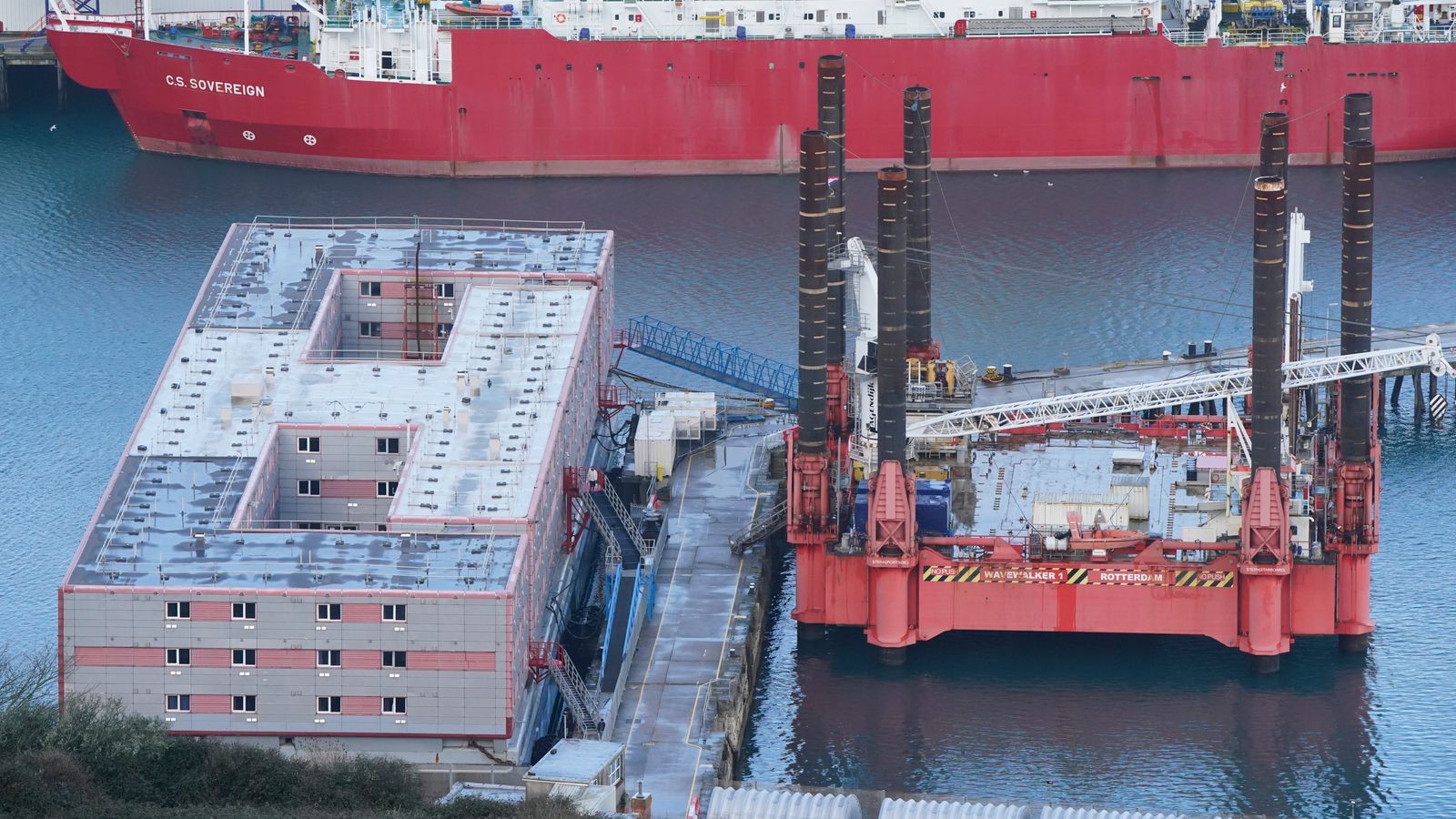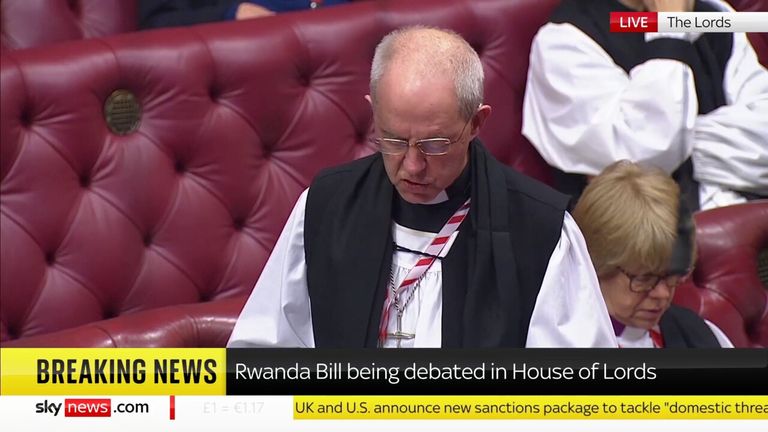The government’s alternative plans for housing asylum seekers will actually cost the taxpayer millions more than the hotels they seek to replace, according to a public spending watchdog.
A report from the National Audit Office (NAO) said accommodating those waiting for asylum decisions on barges or former RAF bases would cost the Home Office £1.2bn – £46m more than using hotels.
And while £230m is expected to have been spent on developing four alternative sites by the end of March, only two have opened so far – and they were only housing around 900 people by the end of January.
As a result, performance reviews have now rated the Home Office as “red”, meaning its delivery goals appear “unachievable”.
The head of the NAO, Gareth Davies, said that while the government had “made progress” in cutting hotel numbers by 60 from the 398 being used before January, it had “incurred losses and increased risk” by “rapidly progressing its plans to establish large sites”.
He called on the Home Office to “reflect on lessons learned” and “improve coordination” with local authorities.
However, Labour’s shadow home secretary Yvette Cooper called the conclusions “staggering” and accused Prime Minister Rishi Sunak of having “taken the Tories chaos and failure in the asylum system to a new level”.
Archbishop of Canterbury: Asylum system is broken
The report comes as the government continues to battle to get its Rwanda plan through parliament, with the aim of deterring asylum seekers from making dangerous Channel crossings to the UK – but it has received huge criticism from opposition MPs, campaigners and even the courts.
The bill will head back to the House of Lords today, but peers are expected to push for extra changes and the watering down of some of the policy before letting the legislation come into force.
Faith leaders, including the Archbishop of Canterbury, publicly backed proposals to overhaul the “broken” asylum system in the UK.
Recommendations from the independent Commission on the Integration of Refugees include allowing migrants to work in the UK after six months of waiting for an asylum decision, and giving arrivals free English lessons from the first day they arrive.
The Most Rev Justin Welby said: “It’s widely acknowledged that our asylum system is broken – it needs rebuilding with compassion, dignity and fairness at the centre.
“This requires thoughtful, well-informed consideration which promotes collaboration and common ground, not division.”
Setbacks in alternate accomodation
The government made ending the use of hotels for asylum seekers a key pledge in 2022, estimating that the rooms were costing the taxpayer £8m a day.
Ministers claimed the Bibby Stockholm barge in Portland, Dorset, two former RAF bases in Scampton, Lincolnshire, and Wethersfield, Essex, and ex-student accommodation in Huddersfield, West Yorkshire, would cut costs – despite opposition over the suitability of the sites.
But the barge has faced a raft of setbacks – including an outbreak of Legionella in the days after it took its first asylum seekers – and, according to the NAO, the set-up costs of the RAF bases have risen from £5m each to £49m for Wethersfield and £27m for Scampton.
The watchdog’s report also said only Wethersfield and the Bibby Stockholm had begun housing people, with just 576 men placed at the former – which has a capacity of 1,700 – and 321 men at the latter – which has room for around 500 – by the end of January, though Scampton and Huddersfield should start taking people in the next two months.
Following the government’s decision to scale back the capacity at Scampton from 2,000 to 800, the NAO said the Home Office was considering reducing the maximum amount at Wethersfield too.
Elsewhere in the report, the NAO accused the Home Office of prioritising awarding contracts “quickly”, and “modifying existing contracts over fully-competitive tenders”, with “overly-ambitious accommodation timetables” leading to “increased procurement risks”.
They criticised the lack of engagement with local communities before deploying emergency planning rules so the sites could be used.
And they said there were “uncertainties” around the implementation of the Illegal Migration Act, which made it harder to predict what asylum accommodation would be needed going forward.
NAO chief Mr Davies said: “The Home Office has made progress in reducing the use of hotels for asylum accommodation. Yet the pace at which the government pursued its plans led to increased risks, and it now expects large sites to cost more than using hotel accommodation.
“The Home Office continued this programme despite repeated external and internal assessments that it could not be delivered as planned.
“Its plan to reset the large sites programme makes sense, and the Home Office should reflect on lessons learned from establishing its large sites programme at speed and improve coordination with central and local government given wider housing pressures.”
The chair of the Public Accounts Committee, Meg Hillier, criticised the Home Office for not understanding the challenges it faced in setting up large sites and “moved too quickly, incurring losses, increasing risks and upsetting local communities, and the sites are housing fewer people than planned”.
She added: “The Home Office must do better when it resets its programme and provide safe and suitable accommodation for asylum seekers at the best value for taxpayers’ money.”
And Labour’s Ms Cooper added: “The prime minister claimed that 10,000 people would be housed in these major sites to save money on costly hotels.
“That plan has failed on every level with only a fraction of that number on those sites and the costs going through the roof.
“Labour will clear the backlog, end asylum hotel use and set up a new returns and enforcement unit so those with no right to be in the UK are swiftly returned.”
A Home Office spokesperson said: “We have always been clear that the use of asylum hotels is unacceptable, and that’s why we acted swiftly to reduce the impact on local communities by moving asylum seekers on to barges and former military sites.
“While we must provide adequate accommodation for asylum seekers who would otherwise be destitute, thanks to the actions we have taken to maximise use of existing space and our work to cut small boat crossings by a third last year, the cost of hotels will fall – and we are now closing dozens of asylum hotels every month to return them to communities.
“But we have further to go, which is why we are passing the Safety of Rwanda Bill, deterring Channel crossings and get flights off to Rwanda – because it is only when people are discouraged from taking those journeys that we can end asylum hotel use for good.
“While the NAO’s figures include set up costs, it is currently better value for money for the taxpayer to continue with these sites than to use hotels.”



